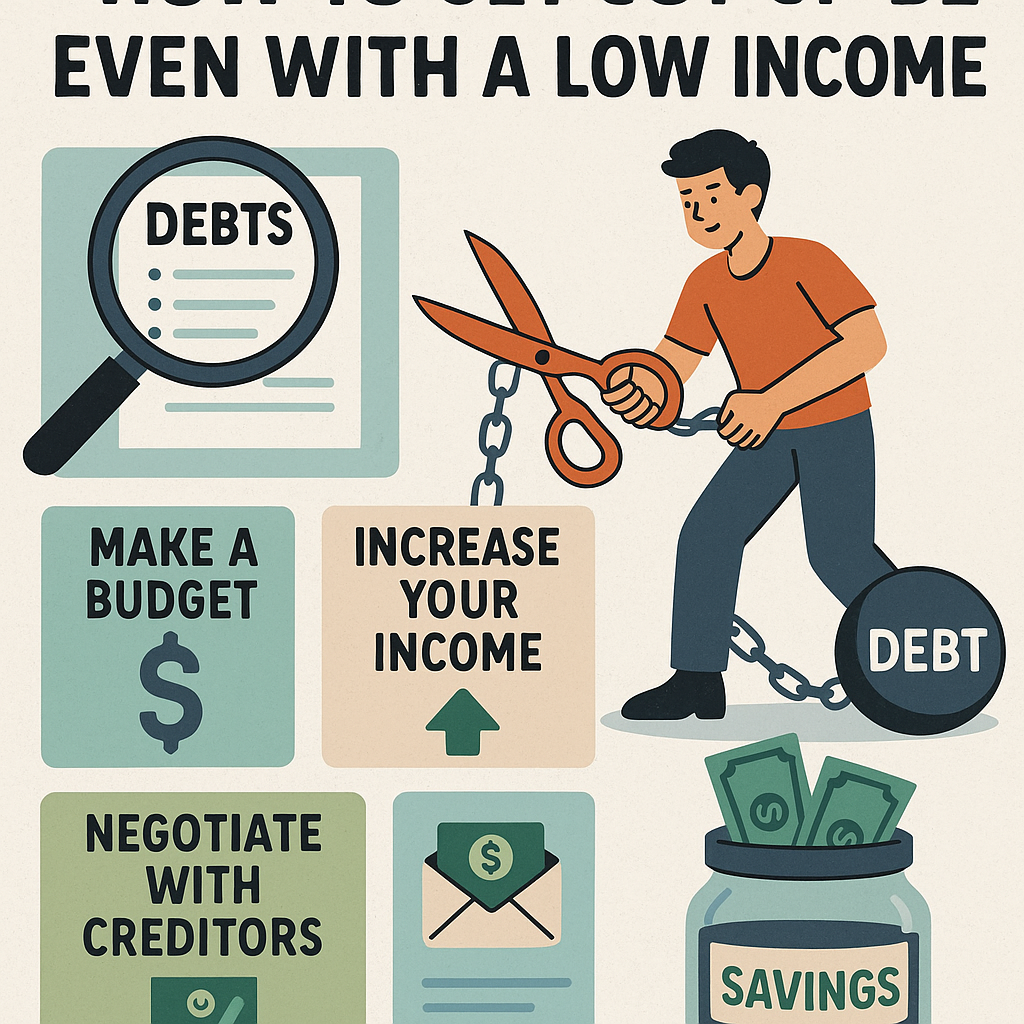Getting out of debt can feel like climbing a mountain—especially when your income is limited. But no matter how tight your budget is, it’s still possible to take control of your finances and become debt-free with a smart, disciplined approach. This article will guide you step by step to reduce debt and build a stable financial future—even on a low income.
Understand Your Total Debt
Before you can start reducing your debt, you need to get a clear picture of it.
List Every Debt You Owe
Include:
- Credit cards
- Student loans
- Personal loans
- Medical bills
- Overdue utility payments
- Any borrowed money from friends or family
For each debt, write down:
- The total amount owed
- The minimum monthly payment
- The interest rate
Organize by Priority
There are two main ways to prioritize:
- Snowball method: Pay off the smallest balance first to gain momentum.
- Avalanche method: Pay off the highest interest rate first to save more money in the long term.
Choose the strategy that fits your personality and motivates you to keep going.
Create a Bare-Bones Budget
When your income is low, a minimalist budget is essential.
Cut Non-Essentials
Review every spending category. Eliminate or reduce:
- Subscriptions
- Dining out
- Entertainment
- Shopping
Redirect that money toward your debt.
Focus on Needs
Make sure your basic needs—housing, food, transportation—are covered. After that, everything else should be put toward minimum payments and extra debt payments.
Increase Your Income (Even a Little)
If your budget is already bare, the next step is increasing your income.
Try Simple Side Hustles
- Freelance services (writing, design, tutoring)
- Selling items you no longer need online
- Food or grocery delivery
- Pet sitting or dog walking
- Babysitting
Even an extra $50–100 per month can accelerate your debt payoff.
Look for Gig Work
Platforms like TaskRabbit, Upwork, and Fiverr offer short-term gigs you can do from home or locally.
Negotiate with Creditors
Don’t be afraid to reach out and ask for better terms.
What to Ask For
- Lower interest rates
- Payment extensions
- Waived fees
- Debt settlement (only as a last resort)
Explain your situation honestly. Many creditors prefer partial payments over none.
Make More Than the Minimum Payment
Minimum payments keep your account current—but they do almost nothing to reduce your debt quickly.
Apply Extra Income
Any bonus, tax refund, or gig earnings should go toward your debt.
Use the Debt Snowball or Avalanche Strategy
Stick with your chosen method and apply all extra funds to one target debt at a time, while making minimum payments on the others.
Use Windfalls Wisely
Got a refund, birthday cash, or gift money? Use it to reduce your debt—not for unnecessary spending.
Build a Mini Emergency Fund First
Before paying off everything, set aside at least $300–$500 to avoid using credit cards in emergencies.
Stay Consistent and Patient
Getting out of debt takes time—especially on a tight income.
Track Progress
Make a chart or spreadsheet. Each time your balance goes down, celebrate the progress, even if it’s small.
Don’t Compare Yourself
Everyone’s financial journey is different. Focus on your own path and progress.
Consider Professional Help if Needed
If your situation feels overwhelming, help is available.
Talk to a Credit Counselor
Reputable non-profit organizations can:
- Help you make a debt management plan (DMP)
- Lower interest rates through negotiation
- Provide financial education
Avoid Debt Relief Scams
Stay away from companies that charge large upfront fees or promise instant results. Do your research and stick with certified agencies.
Build Better Habits to Stay Debt-Free
Once you’ve paid off debt, don’t go back to the same spending patterns.
Build a Realistic Budget
Use what you’ve learned to build a flexible budget that supports your lifestyle and goals.
Save Automatically
Even small amounts matter. Set up automatic transfers to a savings account.
Use Credit Responsibly
Avoid unnecessary borrowing. If you use a credit card, pay off the balance in full every month.
Final Thoughts: You Can Do This
No matter how low your income is right now, you can get out of debt. It won’t be easy or instant—but it’s absolutely possible. The key is to take consistent steps, no matter how small, every single month.
Focus on progress over perfection. Your financial freedom is worth the effort—and every step you take brings you closer.
